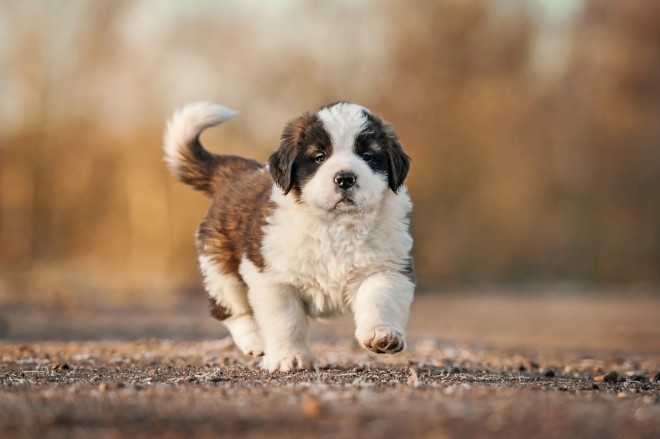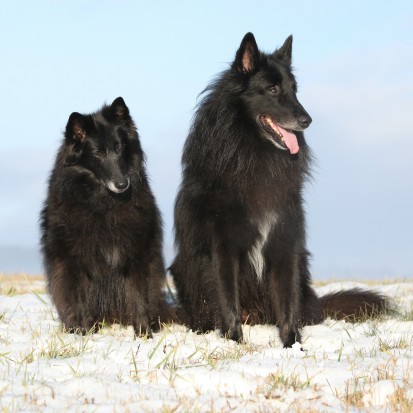Choosing a dog is a lot of fun, and an important decision, as he will be a part of your life for the next 10 years or more. Picking one is not that difficult if you keep this in mind: know how the characteristics of the breed will fit in with your lifestyle.
When choosing a dog breed it's a good idea to talk with people who have first hand experience with the breed you are interested in. Use as many resources as possible before making the choice so both of you will be happy together.
It is wise to pick a dog based on it抯' personality, energy level, and maintenance level, rather than picking a dog for it抯' looks, or because it is popular.
Males are usually larger, stronger, and more aggressive, and they make excellent watchdogs. On the other hand, females are usually more affectionate and gentle, and if they are purebred dogs and are bred with males of their breed, their pups can be sold for profit.
One way to find a reputable breeder is to get a referral from a national kennel club. Most good breeders will ask you questions and want to know what kind of home the puppy will be going to.
Choosing a dog should be a two-way street. Your not just choosing a puppy, the puppy will be choosing you. Choosing the wrong one for the wrong reasons can make you and the dog unhappy later on.
What are the wrong reasons? choosing a breed just for its looks or an image, for example. Pit Bulls are very popular now, and people have gotten them because someone they know did. They did not pick a dog that fit their lifestyle or needs. As a result, many dogs have ended up in shelters or worse.
So which is better, Mutt or Purebred? This question is hard to answer because a purebred dog sometimes turns out to be less desirable than expected, while a mongrel often makes an alert, intelligent, and delightful family pet.
If you choose your new dog at the local animal shelter, look for a dog that is active, but not overly aggressive or tends to nip.
Dogs from shelters and the pound desperately need homes and can be excellent pets, but remember that some dogs are taken to shelters because of behavioral problems.
Too many dogs are given up when normal, easily modified behaviors are allowed to become problems. This does not mean that dogs that are in shelters are bad dogs. There is an old saying: There are no bad dogs, just bad owners.
If you've never had a dog before, I'd suggest choosing a breed (or combination of breeds) that is relatively easy to train. Breeds that have been developed to work closely with humans such as Herding dogs and Retrievers are much easier to train than some.
Dogs that need a firm hand such as the Rottweiler, or hyperactive dogs like a Jack Russell terrier, are not ideal choices for the first time dog owner.
A Doberman is another poor choice for the first time dog owner. While these can be one of the best overall family dogs, choosing one must be done with care paying close attention to the temperament of the parents.
Dobies are strong, fast, high energy, intelligent and stubborn. They like to do things their way. For this reason they need a lot of management. On the other hand, they are fiercely loyal and protective of their family. Does it sound like I have first hand experience with this breed? The answer is yes, but let抯 move on.
A few other things to consider...
?Temperament/disposition: when choosing a dog try to find out if the dog is affectionate, stand-offish, or possibly aggressive.
?Grooming: when choosing a dog consider whether the breed requires little or constant grooming, clipping, brushing, nail clipping, ear cleaning, or dental care.
?Exercise: when choosing a dog find out if the breed requires little exercise or lots of vigorous exercise.
?Training: when choosing a dog try to determine if the breed takes easily to command or does it require extra patience to train.
?Other pets: If you have other pets, make sure the dog you select is accepting of other animals, and if your current pets can tolerate a dog. This especially applies to cats.
In addition:
Be aware that dogs with long, floppy ears are more prone to ear infections and require frequent thorough ear cleanings.
Most short haired, smooth-coated dogs are major shedders, so be prepared to do some extra cleaning up. Also, certain types of dogs can do a lot of drooling.
Size:
You may want a small dog that you can carry around, or you might have your mind set on a large breed. If you can抰 decide, then maybe a medium size dog is the best choice. Small dogs are easily injured.
Also, small dogs can be more sensitive to colder temperatures. Small dogs need obedience training like any other dog. Some small dogs can develop tough dog attitudes, seemingly to compensate for their size.
Big, happy dogs with long tails need room to move around. Many a large dog has swept the coffee table clean wagging his tail as he walks by. Another consideration is expense: the larger the dog, the more expensive things like dog food, supplies, and medical treatments become.
Older Dogs:
Bringing a senior dog into your home can be a wonderful way to bring joy to the golden years of a dog. Unfortunately, senior dogs are less likely to be adopted and often end up living out their lives in shelters or being euthanized.
A senior dog can make a fine companion if you are looking for a low energy dog, however it is important to understand that your senior dog requires special attention. He will need frequent veterinary check-ups and is more likely to develop heath problems that can cost time and money.
Unlike a puppy or adult dog, know that you will not have as many years with your senior dog. If you are willing to accept the responsibilities, consider adopting a senior dog.
In Conclusion:
A dog will be your best friend, give you unconditional love, and be loyal to the end. All you have to do is pick the right dog and give him or her, the best home you possibly can. Not a bad deal if you ask me.

 When Cats Are Sick Why Do They Hide Away?
When Cats Are Sic
When Cats Are Sick Why Do They Hide Away?
When Cats Are Sic
 Few Advantages Of Equine Ulcer Supplements Available Online
Few Advantages Of Equine Ulcer Supplements Available Onlin
Few Advantages Of Equine Ulcer Supplements Available Online
Few Advantages Of Equine Ulcer Supplements Available Onlin
 Are You Inadvertently Sabotaging Your Dog’s Recall Reliability?
Are You Inadverte
Are You Inadvertently Sabotaging Your Dog’s Recall Reliability?
Are You Inadverte
 Mast Cell Tumours In Dogs
Mast Cell Tumours
Mast Cell Tumours In Dogs
Mast Cell Tumours
 Should I Get A Bitch Or A Dog?
Should I Get A Bi
Should I Get A Bitch Or A Dog?
Should I Get A Bi